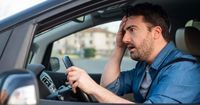The DVLA is set to send out letters to certain drivers following a significant rule change implemented last week. Electric vehicle (EV) owners, who were previously exempt, will now be required to pay vehicle tax in the same manner as petrol and diesel drivers. This adjustment will be substantial for many EV owners who have grown accustomed to not paying, a benefit often associated with switching to electric. The Government has abolished these exemptions, meaning EV owners will now have to pay like everyone else.
Tax forms will be dispatched to EV owners when it's time for them to renew - marking the first time they will have to pay. For those with vehicles manufactured after 2017, an annual charge of £195 will apply. Lower rates will be applicable to those with older or brand-new cars, reports Birmingham Live.
The standard tax rate for drivers of petrol and diesel cars has also increased, rising from £190 to £195. Chris Adams, group operations director at Brindley Group, clarified: "From April 1, newly registered electric vehicles will pay £10 VED in the first year and then increase to £195 thereafter. Electric cars registered between April 1, 2017 and 2025 will pay £195 per year." He further added: "These changes represent the Government's commitment to electrifying the cars on Britain's roads, ensuring that there is still adequate income from cars, even if they're electric."
In addition to the tax changes, the DVLA has warned new scam messages circulating among road users, with thousands of drivers reporting incidents over the past year. Officials at the DVLA have explained that fraudsters were “using more sophisticated ways” to con road users, with those unaware likely to be caught out. Chiefs have stressed messages sent to drivers were promising car tax refunds while others were simply imitating official Government websites.
Road users have already shown their concern, with new data showing that a whopping 20,000 customers contacted the DVLA to report scams last year. The DVLA posted the critical message to unaware road users on social media site X earlier this week. The DVLA posted: “Fraudsters are using more sophisticated ways to try and scam motorists – from promises of hefty vehicle tax refunds to websites attempting to look like DVLA.”
The DVLA followed it up with an extended post warning road users to be “vigilant” before being caught out by fake messages. The DVLA added: “DVLA is reminding motorists how they can keep themselves safe from vehicle and driving licence scams. Latest figures show that in 2024, almost 20,000 customers called DVLA’s contact centre to report fraudulent activity. With fraudsters increasingly using more sophisticated ways to trick their victims, it has never been more important for motorists to be vigilant and aware of how to recognise fraudulent emails, texts, websites and calls.”
To help road users, the DVLA confirmed officials will never ask for any bank account details or payment details through a message. The DVLA stated they would only ask for personal details by email or text if a live enquiry is active. Meanwhile, they stressed that car tax refunds tend to be issued automatically and never through any dodgy links.
The DVLA urged road users to not share photos of personal documentation to avoid being the victim of identity fraud. Finally, motorists should always make sure they are using GOV.UK for any enquiries instead of third-party websites. The DVLA added: “If you receive one of these emails or texts, do not click on any links. Instead, report it to the National Cyber Security Centre and delete it immediately.”






